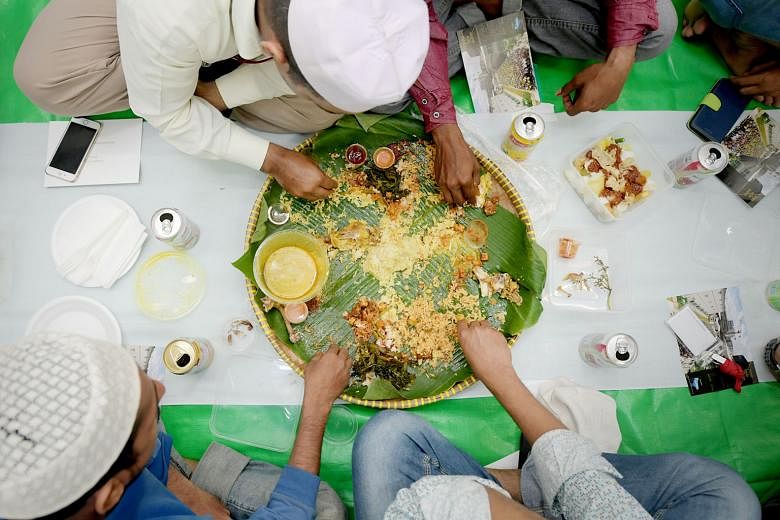Diabetic patients may think that fasting during Ramadan will help to improve their blood sugar control since they are eating less.
However, there are risks associated with fasting for diabetics.
Dr Ester Yeoh, a consultant at Khoo Teck Puat Hospital's Diabetes Centre, said the risks of fasting during Ramadan include low blood glucose (hypoglycaemia), high blood glucose (hyperglycaemia), dehydration and emergencies like diabetic ketoacidosis.
During fasting, some types of anti-diabetic medication can increase the risk of hypoglycaemia in the elderly and in patients with kidney impairment or failure, she said.
Patients can take precautions by monitoring their glucose levels and adjusting their medications.
Under Islamic law, people with diabetes do not have to fast during Ramadan. Those who want to fast should heed their doctor's advice to prevent any complications, said Ms Melissa Ho, senior dietitian at Tan Tock Seng Hospital.
Here are some mistakes diabetics may make when fasting:
1. Not monitoring blood sugar
Pricking the skin to test for blood sugar levels does not invalidate the Ramadan fast, said Ms Ho.
Check your blood sugar levels regularly to monitor how the change in eating habits impacts blood sugar levels during fasting.
2. Delaying treatment
Do not delay the treatment of low blood sugar levels to avoid breaking fast, said Ms Ho.
-
Before you go on a fast
-
More studies are suggesting that intermittent fasting may have health benefits such as weight loss, lowering of blood pressure, reduced blood cholesterol and blood glucose improvement, said Ms Gladys Wong, chief dietitian at Khoo Teck Puat Hospital.
Although there is insufficient evidence to suggest that fasting is necessary for disease management, some people may still want to do it for health reasons.
For people who do not have any pre-existing health conditions, she said, there is no harm in engaging in some sort of fast.
If fasting can help one to become more mindful of one's food intake, she added, it can be used as a strategy for weight control.
However, she said there are two things to take note of:
1. WEIGH YOURSELF BEFORE AND AFTER A FAST
If you are fasting for more than 12 hours, your weight may drop but that is mainly water weight. You need to monitor this to ensure you do not become dehydrated.
2. TAKE IT EASY
Do not exert your body too much if you are on a fast, unless you are very confident it can function without food and water.
Joyce Teo
"Delaying treatment can lead to fainting, diabetic coma and brain damage," she said. "If low-sugar events are not promptly treated, patients will gradually not be able to feel the warning symptoms."
She said patients should check their sugar levels frequently, especially if they notice symptoms of low sugar levels or hypoglycaemia, such as breaking out in cold sweat, weakness, fatigue, trembling, dizziness, confusion and headache.
If their blood sugar level is below 4mmol/L, they should break the fast and take 15g of sugar. This can be three non-sugar-free sweets, half a glass of juice or soft drink, or three teaspoons of sugar dissolved in water.
Wait for 15 minutes and check the blood sugar level again. If it is above 4mmol/L, take a snack containing carbohydrates or have a meal earlier.
If the reading is below 4mmol/L, take another 15g of sugar and repeat till the blood sugar level is back to normal (above 4mmol/L).
3. Not preparing ahead
Diabetes medications should be adjusted by the doctor before the fasting period to prevent poorly controlled blood sugars, said Ms Ho. Do not start fasting and wait for complications to arise before finding out if the medications should be adjusted.
4. Over-indulging in food
Maintaining a healthy and balanced diet is important during Ramadan. Avoid taking large, carbohydrate- heavy meals and sugary drinks after breaking fast as this can increase the risk of complications in people with diabetes, said Dr Yeoh.
Consume foods with low glycaemic index and high fibre as these release energy slowly, and eat less of foods that are high in saturated fats. Be aware of the risk of hyperglycaemia and avoid over- indulging in food and sweet drinks.
After the festival, diabetics should revert to their usual anti- diabetic therapies and continue to check blood glucose levels, said Dr Yeoh.
Joyce Teo

